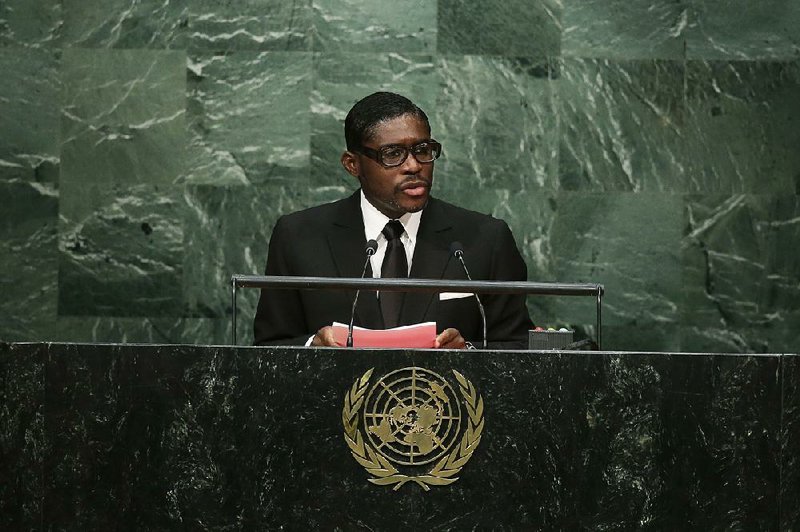NAIROBI, Kenya -- Even before the corruption trial of Equatorial Guinea's vice president began, there was no shortage of publicity about the lavish lifestyle of Teodoro Nguema Obiang Mangue.
News reports say he has enjoyed the use of two yachts worth an estimated $250 million, about twice his country's annual education budget in recent years.
There was also a $200 million mansion in Paris, worth more than double the nation's public health expenditure.
Then there was his $10 million car collection, worth an enormous multiple of the country's median income. In 2011, 77 percent of citizens in Equatorial Guinea lived on less than $2 per day.
In a number of Africa's poorest countries, those close to power have become rich even as their fellow citizens remain mired in poverty. But Obiang, who is the son of oil-rich Equatorial Guinea's longtime president, stands out.
Activists are hoping that Obiang's trial will help prove that corruption carries consequences, even for Africa's political elite. Obiang is accused of using millions in public funds to bankroll his ostentatious lifestyle in France, charges that carry a sentence of up to 10 years.
"By squandering enormous wealth the government has already missed opportunities to invest in health and education," said a Human Rights Watch report this month.
But when the trial began Monday, Obiang, also known as Teodorin, did not appear in court, nor is he expected to travel to France for the proceedings. His lawyers say that he is immune from prosecution because of his position.
"It would be unprecedented in France, unprecedented in the world, to try a sitting vice president," Thierry Marembert, one of Obiang's lawyers, told the court. The defense attorneys have said that Obiang's financial dealings were legitimate under his country's laws, and they defended his luxurious tastes.
After the Dutch government seized the $100 million yacht Ebony Shine in December, acting on a request from Swiss prosecutors who suspect Obiang of money laundering, the vice president's lawyers argued that the vessel belonged to the government of Equatorial Guinea, according to the Maritime Executive, a trade publication. A second yacht linked to Obiang, the Ice, is also owned by that country's government, the publication reported. Obiang's attorneys have also argued the Paris mansion is a diplomatic mission, a claim the court has upheld.
In France, the trial is part of a series of inquiries known as the cases "of the ill-gotten gains." Obiang's case is the first to be heard in court, but other politicians from Congo, Angola and Burkina Faso face similar accusations.
Yet the alleged scale of Obiang's spending, particularly compared with the development indicators in Equatorial Guinea, sets him apart. Even after oil was discovered in the West African country in the 1990s, the government used hardly any of its revenue to improve the lives of its citizens, analysts say.
In 2015, only 25 percent of newborns in the country were immunized for polio and measles, one of the lowest rates in the world. Life expectancy hovers around 57. About half the population lacks access to potable water. In 2012, 40 percent of children in Equatorial Guinea were not in school, according to Human Rights Watch. Statistics on government spending are limited, but the 2011 health and education budgets were a mere $92 million and $140 million, respectively, according to the Human Rights Watch report -- a small fraction of national income.
In 2014, Obiang settled a civil forfeiture case with federal prosecutors in the U.S., agreeing to "relinquish more than $30 million of assets purchased with corruption proceeds," according to a Department of Justice press release.
"Through relentless embezzlement and extortion, Vice President Nguema Obiang shamelessly looted his government and shook down businesses in his country to support his lavish lifestyle, while many of his fellow citizens lived in extreme poverty," said Assistant Attorney General Leslie R. Caldwell of the department's Criminal Division.
Aside from the mansions and cars and yachts, Obiang also kept an expensive memorabilia collection, including the jacket worn by Michael Jackson in the "Thriller" music video and one of the singer's crystal-studded gloves. He was forced to sell them after the U.S. case.
SundayMonday on 06/25/2017

